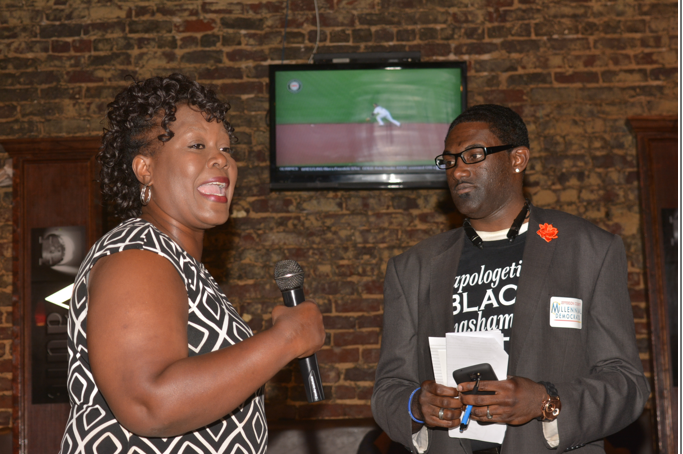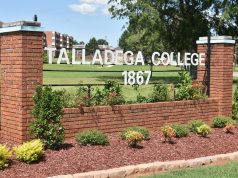
By Ariel Worthy
The Birmingham Times

County Millennial Democrats with Birmingham City Councilor Sheila Tyson. (Stephonia Taylor Mclinn photo, special to The Times)
The event, sponsored by the Jefferson County Millennial Democrats, was billed as the “State of Black Birmingham.”
City and community leaders addressed a diverse crowd at The Vault to hear issues of interest throughout the Magic City.
Panelists invited were Birmingham Mayor William Bell; Birmingham City Council President Johnathan Austin; Jefferson County District Attorney Brandon Falls; community activist Frank Matthews; Birmingham School Board President Wardine Alexander and Black Lives Matter activist Martez Files.
Falls did not attend and was replaced by Charles Henderson, who is running for District Attorney.
The conversation centered on education, public safety and community development.
Lady Woo from 95.7 Jamz, a co-moderator, asked the first question: “Why name it the State of Black Birmingham?”
“We’re 74 percent of the city and there are questions and we need answers,” said LeDarrius Hilliard, president of the Jefferson County Millennial Democrats.
“But this isn’t limited to Black Birmingham, right?” Lady Woo asked.
“Yes, this is limited to Black Birmingham,” Hilliard responded.
Why?
“We invite members of white Birmingham to come and find out about the real issues concerning black Birmingham,” Hilliard said. “There is a very distinct difference between the black areas of Birmingham as opposed to the white areas of Birmingham . . . with us having elected officials that are black… at what point to black lives matter in a [majority] black city?”
Education
Lady Woo talked about new reading programs and after-school care programs introduced to Birmingham school districts, but wanted to know about students.
“What are we doing to focus on the bodies and not the building?” she asked.
Alexander talked about new career academies and after school programs in place for students.
Files said there are a number of programs for high-performing and students and low-performing students, “but we miss this population of students that are C students that no one recognizes, and there are no initiatives targeted at them.”
He also suggested ways to access the parents other than two-hour PTA meetings “even if it’s just sending an email or text message about important things and events,” he said. “Ask the parents what can you do to help them.”
Bell said the city is working to improve the schools that are considered failing.
“We have been proposing is the city’s support in reading programs for the schools,” the mayor said.
The support is needed from not only city officials, but people in the community as well to help fund the program, he said.
Public safety
Henderson said reform in the criminal justice system is desperately needed.
“When a black man walks into a courtroom he sees a white judge, a white prosecutor and he’s represented by a white guy. So the perception there is he doesn’t have a chance,” Henderson said. “We have spent the last 30 plus years using prisons as a mean to try to solve our problems … we have to put the resources that we put into prison where we can actually impact lives.”
Those resources are education, Henderson said. “We have to have social workers in the school systems,” he said.
Another area of importance is community policing.
“Community policing is making the public aware of crime in their community, and what they can do in their own community to police crime,” Bell said. “It’s to bring back sensibility to the community, we want safe communities.”
Austin, however, said that community policing is more than making citizens aware.
“One thing we’re failing to do is connect our community with police,” Austin said. “The problem is there is a disconnect between the community and our police. They used to walk through our neighborhood, getting to know the residents… I think that community policing should be about reconnecting our communities with those who are sworn to protect us.”
Hilliard said the event was a success because of issues the community wanted addressed.
“We wanted to find out what community policing was, and why our schools were closing,” Hilliard said. “Overall it was productive and we got the answers we needed.”




